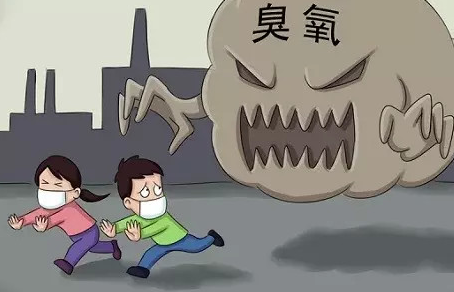Warm days come with a downside, as masks can't stop pollutant at ground level in Beijing
温暖的天气也有一个不好的地方,那就是口罩挡不住北京地表层的污染物了。
Excessive ozone gas has become the prime pollution problem in Beijing in recent days, replacing the notorious PM2.5, and it's likely to linger for a couple of days, the capital's environmental monitoring authority said last Monday.
首都的环境监测部门上周一表示,过量的臭氧已经取代了讨厌的PM2.5,成为北京的首要污染问题。这种情况有可能会延续好几天。
Because of the sunshine, many residents may not have noticed that ozone reached an alarming 242 micrograms per cubic meter, according to the Beijing Environmental Monitoring Center.
据北京环境监测中心透露,由于阳光大好,许多市民可能并没有注意到臭氧含量已经达到了惊人的每立方米242微克。

During warm weather, ground-level ozone increases. It is known to harm lung function and irritate the respiratory system. Exposure to ozone is linked to premature death, asthma, bronchitis, heart attack and other cardiopulmonary problems.
在气候温暖的时候,地面的臭氧含量会增加。众所周知,臭氧会对肺功能和呼吸系统造成损害。暴露在臭氧环境中会导致过早死亡,哮喘,支气管炎,心脏病和其他心肺问题。
Different from the protective layer of ozone in the upper atmosphere, excessive ozone concentration at ground level is tied directly to health. Therefore, experts strongly suggest that people stay indoors around noon to avoid the gas, which, unlike particulate matter, cannot be blocked by protective masks.
和上层大气中的臭氧保护层不一样,地面臭氧浓度过高会直接与健康产生联系。因此,专家强烈建议,人们尽量在中午的时候呆在室内避开臭氧,因为臭氧和其他的污染物不同,口罩并不能阻挡它。
Ozone at ground level is generated mainly through complicated photochemical reactions. It is closely related to other air pollutants, such as volatile organic compounds and nitrogen oxides. Levels of ozone typically rise at midday due to strong sunshine and higher temperatures, said Chen Nianliang, a researcher at the monitoring center.
地面的臭氧主要是产生于复杂的光化学反应,和其他空气污染物联系很紧密,比如挥发性有机物和氮氧化物。监测中心的一名名叫陈念良的研究员表示,由于强烈的阳光和高气温,臭氧含量通常会在中午时分骤升。
Every summer, ozone concentration typically soars in Beijing, overtaking PM2.5 as the prime pollutant.
每年夏天,北京的臭氧浓度都会上升,超过PM2.5成为首要污染物。
In 2015, the average ozone concentration in China's 74 major cities increased by 3.4 percent year-on-year, an increase of 7.9 percent over 2013, especially in the Yangtze River Delta region in the south, said Luo Yi, head of the environmental monitoring department at the ministry, in February.
今年二月份,环境监察部门主任罗毅表示,2015年,中国74个主要城市,特别是在南方长江三角洲地区,平均臭氧浓度同比增长了3.4%,相较于2013年增长了7.9%。













